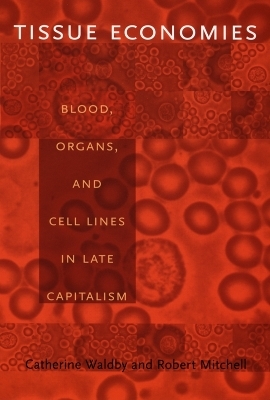
Tissue Economies
Duke University Press (Verlag)
978-0-8223-3770-6 (ISBN)
As new medical technologies are developed, more and more human tissues—such as skin, bones, heart valves, embryos, and stem cell lines—are stored and distributed for therapeutic and research purposes. The accelerating circulation of human tissue fragments raises profound social and ethical concerns related to who donates or sells bodily tissue, who receives it, and who profits—or does not—from the transaction. Catherine Waldby and Robert Mitchell survey the rapidly expanding economies of exchange in human tissue, explaining the complex questions raised and suggesting likely developments. Comparing contemporary tissue economies in the United Kingdom and United States, they explore and complicate the distinction that has dominated practice and policy for several decades: the distinction between tissue as a gift to be exchanged in a transaction separate from the commercial market and tissue as a commodity to be traded for profit.Waldby and Mitchell pull together a prodigious amount of research—involving policy reports and scientific papers, operating manuals, legal decisions, interviews, journalism, and Congressional testimony—to offer a series of case studies based on particular forms of tissue exchange. They examine the effect of threats of contamination—from HIV and other pathogens—on blood banks’ understandings of the gift/commodity relationship; the growth of autologous economies, in which individuals bank their tissues for their own use; the creation of the United Kingdom’s Stem Cell bank, which facilitates the donation of embryos for stem cell development; and the legal and financial repercussions of designating some tissues “hospital waste.” They also consider the impact of different models of biotechnology patents on tissue economies and the relationship between experimental therapies to regenerate damaged or degenerated tissues and calls for a legal, for-profit market in organs. Ultimately, Waldby and Mitchell conclude that scientific technologies, the globalization of tissue exchange, and recent anthropological, sociological, and legal thinking have blurred any strict line separating donations from the incursion of market values into tissue economies.
Catherine Waldby teaches medical sociology at the University of New South Wales. She is the author of The Visible Human Project: Informatic Bodies and Posthuman Medicine and AIDS and the Body Politic: Biomedicine and Sexual Difference. Robert Mitchell is Assistant Professor of English at Duke University. He is a coeditor of Data Made Flesh: Embodying Information and Semiotic Flesh: Information and the Human Body.
Acknowledgments vii
Introduction: Gifts, Commodities, and Human Tissues 1
Part I. Tissue Banks: Managing the Tissue Economy 31
1. Blood Banks, Risk, and Autologous Donation: The Gift of Blood to Oneself 35
2. Disentangling the Embryonic Gift: The UK Stem Cell Bank 59
Part II. Waste and Tissue Economies 83
3. The Laws of Mo(o)re: Waste, Biovalue, and Information Ecologies 88
4. Umbilical Cord Blood: Waste, Gift, Venture Capital 110
Part III. Biogifts of Capital 131
5. Commodity-Communities and Corporate Commons 135
6. Real-Time Demand: Information, Regeneration, and Organ Markets 160
Conclusion: The Future of Tissue Economies 181
Notes 189
Bibliography 207
Index 227
| Reihe/Serie | Science and Cultural Theory |
|---|---|
| Verlagsort | North Carolina |
| Sprache | englisch |
| Maße | 152 x 229 mm |
| Gewicht | 345 g |
| Themenwelt | Sozialwissenschaften ► Politik / Verwaltung ► Staat / Verwaltung |
| Sozialwissenschaften ► Soziologie | |
| Technik ► Umwelttechnik / Biotechnologie | |
| Wirtschaft ► Volkswirtschaftslehre ► Mikroökonomie | |
| ISBN-10 | 0-8223-3770-3 / 0822337703 |
| ISBN-13 | 978-0-8223-3770-6 / 9780822337706 |
| Zustand | Neuware |
| Informationen gemäß Produktsicherheitsverordnung (GPSR) | |
| Haben Sie eine Frage zum Produkt? |
aus dem Bereich


